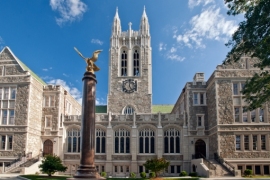With this item, TheoPol resumes its weekly schedule.
As the parent of a high-school junior who will be deep into the college search soon enough, I’ve been forced to reflect on the purposes of a college education. My philosophical conclusion is that college is fundamentally about two things: getting into the habit of lifelong learning, and forming or developing yourself as a person. My parental view is less untroubled. I grapple with the idea that college is really about spawning a career and, by the grace of the financial gods, eluding the demons of monstrous debt.
These perspectives are not naturally allied, and increasing numbers of middle-class families are acting on the latter assumption and making stark choices about college.
Last month, the gigantic student lender Sallie Mae issued its annual report, How America Pays for College. Among other sobering results, the study found that students are dropping out of the humanities right and left, stampeding toward degrees such as nursing that would appear to make them more employable. More than ever, families are eliminating college choices—for example, the high-priced liberal arts school that offers a well-rounded education—because of costs. And, for the first time in recent memory, more than half of all college students are living at home.
How are the thought leaders of the liberal arts responding to these realities? In the circles I travel in, some are doubling down on the message that a university is not an employment agency with gothic towers. On the contrary, students are there to discover their passions, to learn how to think and to serve others, according to many of the messengers.
One of the more colorful among them is Father Michael Himes, professor of theology at Boston College. Several times this past summer, he delivered the word to incoming students and their parents at Boston College’s freshmen orientations, one of which I attended in June, not officially as a parent but as a contributing writer for Boston College Magazine. Here’s part of my rendering of the Himes presentation:
After a preamble about how “robust conversation” defines a great university, Himes arrived at his core contention. A great university is not about finding a job or “adding a zero to a starting salary line” or even getting into graduate school, he said. “Don’t get me wrong,” Himes went on in his curiously blended accent, part Brooklyn and part Britain (having grown up in the borough, around relatives from abroad). “It’s terribly important. It’s just not what a university is good at. It’s not what it’s about.” He continued—“It’s about producing intellectuals.” These are people who are never completely satisfied with an answer to a big question and always keep probing. Their rallying cry is, as Himes put it, “Yes, but.”
At a place like Boston College, he said, students ask questions about human existence, about who they want to become, and how they can channel their passions and talents into service to the world. During the Q&A, a parent asked from his seat in a middle row what “we,” parents, should fear most about what lies ahead in college. Himes replied in an instant—“that at no time in the next four years will your student shock you and fill you with horror.” The response brought down the house, although a disproportionate share of the high-spirited clapping and cheering appeared to come from younger hands and voices.
Part of me wonders if this is an ivory tower version of Mitt Romney’s Thurston Howell-like advice to students: “Borrow money from your parents if you have to.” The variation might be—Worried about paying for college and earning a livelihood after you graduate? Become an intellectual! On its face, it’s a non-response.
But leaving aside “intellectual,” the case that Himes makes is not without its practical side. He’s shrewd enough to know that a narrow vocational training for jobs today might not help much tomorrow, and that young people, most of all, need to learn how to think, analyze, communicate, and problem-solve. Or at least that’s the belief of those who take the leap of liberal arts faith.
And then there’s the nagging question of being a person. College students need space and (dare I say) intellectual leisure to reflect on who they are, and what they have to offer to the world. I’m not sure if this could happen if they’re desperately seeking a career from day one. Not an easy question, but an important one, especially if you agree with Himes when he says: “Before you can do something, you have to be someone.” …read more






